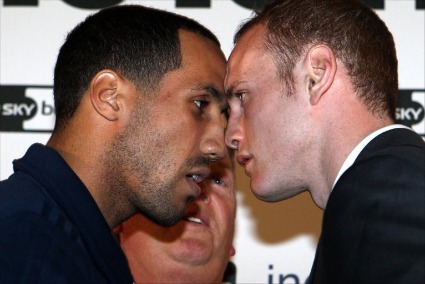(James DeGale, left; George Groves, right)
A mere stones throw from where it all started, the simmering feud between James DeGale and George Groves comes to the boil this weekend in a confrontation so venomous, quill-sharpening activity has been detected within the anti-boxing lobby. Questions raised over the morality of the sport are often rebuffed with the retort that fighters, as sportsmen, seek only to win contests, never to intentionally damage or maim their opponents — and it’s a solid response. At least until grudge matches such as this one barge their way into the equation.
Seething rivalries — unavoidable in a racket where character tips scales and where neon-lit personalities jockey to be king of the heap — edge boxing more towards the legalised battery end of the argument. Ultimately, collisions of this nature are less about titles, pound notes and achievement, and more about the pulverisation of ego.
This particular quarrel is well established. Groves and DeGale, once amateur club buddies as young kids in west London, fell foul of one another in a major way. DeGale, as the elder of the pair (DeGale is 25, Groves 23), entered senior competition first and with Groves in tow to provide regular sparring, he took consecutive ABA championships at 75 kg in 2005-06. It wasn’t until the Harlesden man attempted a hat-trick the following year that things soured. Groves, against the wishes of his trainers, wanted the opportunity to take what James had.
As fate would have it, the pair found themselves pitted against one another in the opening round of 2007, with Groves edging a nip-and-tuck battle on his way to a championship win. DeGale shrugged off his disappointment to take Olympic gold the following year and they’ve been running on parallel lines ever since.
As they hover in the grey area between prospect and contender, a position which would normally see them bolstering their records against faded names and former champs, they’ve elected instead to rid themselves of each other –a bold move when one considers their affiliation with opposing promotional outfits.
In 1997 a similar match had been mooted between Floyd Mayweather and Augie Sanchez (then 12-0 and 15-0 respectively), whose beef had spilled over from the Olympic trials of ‘96. This, though, was in-house match-making on the part of Top Rank, who held the papers on both (an idea ruined after Edgar Garcia sparked “Kid Vegas” a couple of months later). Usually, these fights are left to marinate until world titles come into the mix, or inexplicably lost altogether, as was the strange case involving Lennox Lewis and Riddick Bowe.
Groves, 12-0 (10), holds the Commonwealth title at super middleweight and while DeGale has been slightly less active at 10-0 (8), “Chunky” would appear to have stolen a march in terms of progress made. In ripping the British 168 lbs. title away from the more seasoned Paul Smith before the Liverpudlian’s home fans in December, DeGale looked a potential world beater – a swaggering braggart living up to his own hype. Groves on the other hand is more modest — a genuinely nice kid who’ll have the majority of support behind him on Saturday evening as a result.
Since turning over the pros, challenges for both men have been kept to a minimum. In his ninth outing, Groves overpowered the Ghanaian, Charles Adamu, a solid sort who’d negotiated the full route against the likes of Carl Froch, Otis Grant and Vitaliy Tsypko. Then, in October of last year, the Hammersmith puncher took on Edinburgh’s Kenny Anderson, and came within a whisker of being derailed, prompting the ever astute Frank Warren to call Groves’ bluff.
Competitive action has been more difficult to rustle up for team “Chunky.” Prior to the Smith triumph, DeGale brushed aside an assumed threat from Carl Dilks in the opening round. As a fighter, there is much to admire. Boxing loosey-goosey, DeGale uses his long reach to good effect, spearing his opponents from range before following up with flashing combinations, at times delivered with an open glove (for which he has been warned). Predominately a southpaw, he can switch stances mid-shuffle and he’s also adept at fighting inside. He digs well to the body with both hands, counters superbly with the left hook and he’s extremely quick.
Groves has taken some stick of late, accused of trying too hard to emulate the style of his mentor David Haye. A strong puncher with talent to burn, he remains a work in progress — particularly with regard to defence. His footwork is reminiscent of former world titlist Nigel Benn’s, both in his movement and in the way he shifts his weight between front foot and back. He aims to land reflex power shots on the counter, which restricts his punch output to a degree and leaves him open to being outworked.
DeGale will be encouraged to make the fight, to pressurise Groves and express himself while doing so. Groves, meanwhile, will be instructed to box carefully on the retreat, picking his punches smartly before countering DeGale’s flurries with debilitating hooks inside. Such is the hatred between them though; tactical plans could very quickly dissolve into mayhem. There’s a malicious edge to this match which recalls British grudge fights from yesteryear, spiteful encounters such as Charlie Nash versus Jim Watt, Chris Eubank against Michael Watson and Errol Christie’s showdown with Mark Kaylor.
In a potential classic, Groves will have his moments before being ground down, peppered into submission somewhere close to round 9. He seems destined to be the B-side here, just as the likes of Tommy Hearns, Nigel Benn and Joe Frazier once found themselves to be — everyman figures left obsessing over revenge in the shadows of a showman, one young Groves looks set to be linked with for the remainder of his days.

